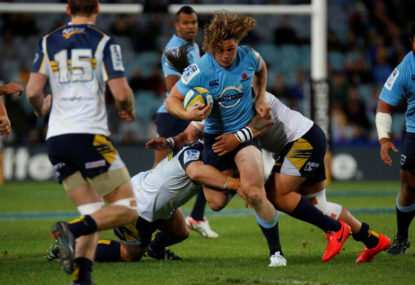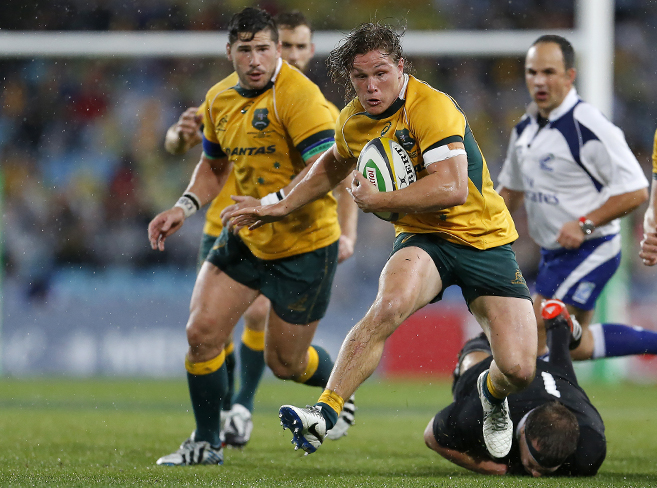If Australia is looking for big men, let's not neglect the old and the fat
Three things in the world of rugby have caught my eye this week, and got me thinking very hard about the way forward, and…

Coming off a World Cup year in 2015, Wallaby Michael Hooper enjoyed one of the longest breaks of his professional career before getting back to work with his NSW Waratahs preparing for the 2016 Super Rugby season.
Speaking to The Roar about returning to training and reaching the fitness peaks required to compete at rugby’s highest level, Hooper made it clear how important a good break is, and how grateful he and his teammates were to be given just that.
“For most of us, it’s probably the biggest break we’ve ever had. It was fantastic to get that amount of time off and great from the club to allow us to have that,” Hooper says.
“A lot of the guys, me as well, put our feet up, chilled out, and got away from all things rugby for a good month.”
For Hooper, that break meant getting in the water as much as possible around his home city of Sydney, having a few beers, and also getting over to Hawaii to support Mick Fanning at the Pipeline Masters.
“But it wasn’t just complete feet up,” Hooper says. “Guys did their own thing away from the Waratahs to keep from falling off that cliff, and guys came back in pretty good shape.”
However, no matter how much effort is put into maintaining fitness over the break, nothing can save a player from the pain of the first days back come preseason.
“Getting back into that first week was just nasty. There was no easing into it,” Hooper recalls. “My body, I couldn’t walk by the Wednesday. That was probably the same for most of the guys.
“From toes to neck, just sore. Your face sore from frowning so much,” Hooper jokes.
“Every muscle was sore, but in fairness, it was getting us in good shape, and we enjoy working hard and getting back into it.”
When it comes time to hit the track, the Waratahs make sure their players are well supported, well fueled, and that their progress is monitored from day one.
“We’re lucky enough to have our protein shakes shaken up for us every time we walk out of the gym, and when we come off the training field.
“The eating is catered to the training load. Carbs when there is going to be days with a lot of running, and trying to minimise those when there’s not [much running],” Hooper says.
“It’s a pretty broad diet, which is lucky, because I treated myself to a little bit of KFC about a week ago,” Hooper admits.
 Michael Hooper breaks free from a tackle against the All Blacks. (Photo: Paul Barkley/LookPro)
Michael Hooper breaks free from a tackle against the All Blacks. (Photo: Paul Barkley/LookPro)
When it comes to tracking a player’s progression throughout a preseason, Hooper says the club monitors how the individual athletes fare on their first day back, then build individual targets and expectations from that.
“A lot of it is around your heart rate, and how your heart is performing. With rugby being such a broad sport, with a different range of athletes within the sport, it’s catered quite individually and position specific.”
As Hooper makes clear, at the Waratahs, technology is playing an increasingly important role in the day-to-day work of support staff regarding how they manage their players.
“I feel like everything we do is monitored, there’s that much gear,” says Hooper. “The main ones for us that we have going on the field are GPS, so your distance travelled, how far you’re running at a certain speed, all that sort of thing.
“That’s live streaming so they can get that straight away on the field and see if you’re working hard or not.
“Another one is heart rate monitors, they are used in everything at the moment, to give live feedback on how your heart is reacting to all the training.
“We see a lot of those results, they’re put up in the physio’s rooms so you can see how you’re travelling. But really it’s mainly for the staff to see if there is anything going wrong with you.”
As a leader at both club and international level, Hooper has developed strong standards when it comes to preparation; despite this, he still often returns to what can only be considered a humble piece of advice when he is enduring a taxing preseason.
“When I was 17 or 18, a physio gave me the advice that no-one plays at 100 per cent. Which really surprised me at the time, because I was young, fresh faced and pretty new to it all,” Hooper recalls.
“I didn’t really believe him. But now after having been around, being lucky enough to be in this environment for a couple of years, you do realise that everyone has got something going on and it’s how you deal with it to the best of your ability and how hard you work at getting yourself to 100 per cent that keeps you on the field.
“That’s the best piece of advice I have received in terms of maintaining your time on the paddock.”
Make this the Year of You with a Fitbit activity tracker. Visit Fitbit.com to find your fit.